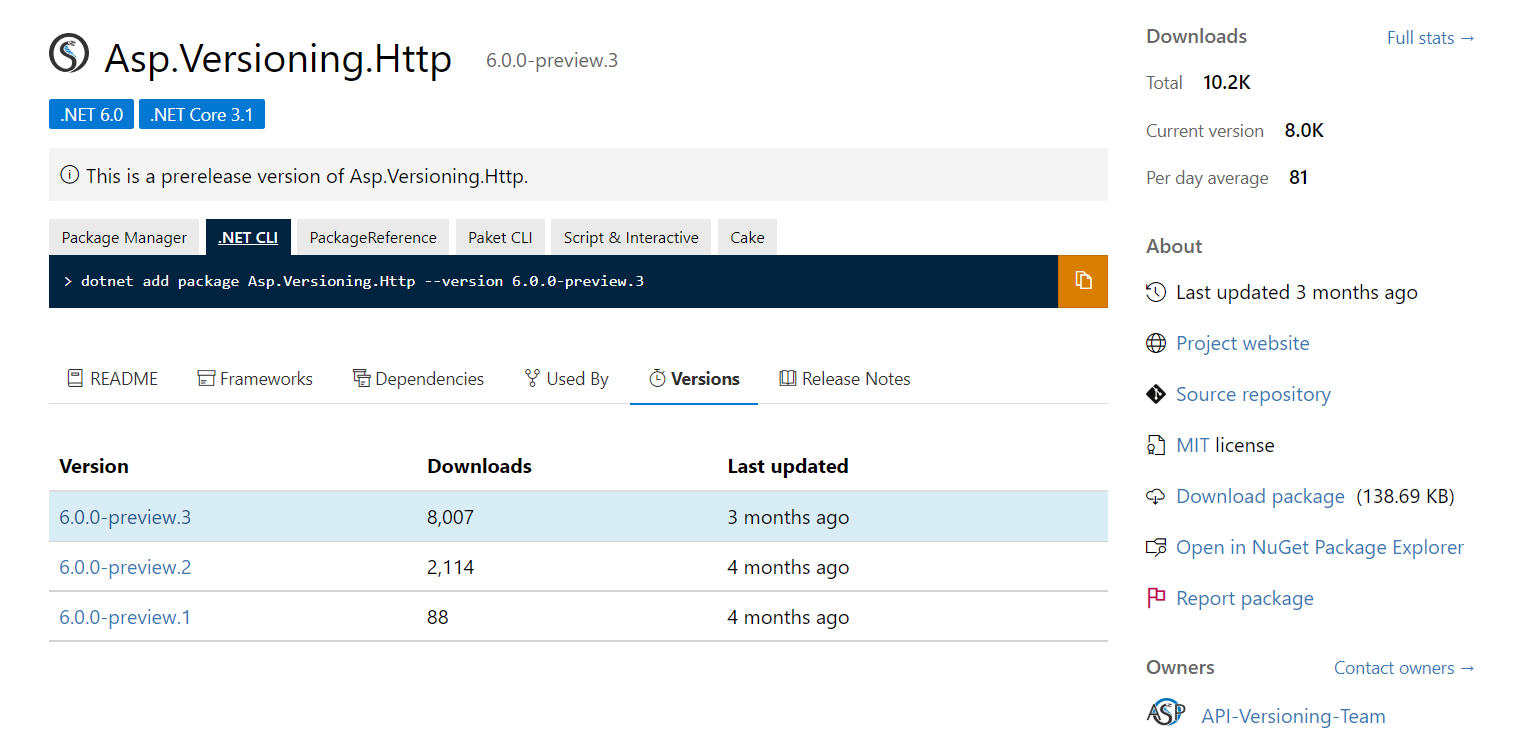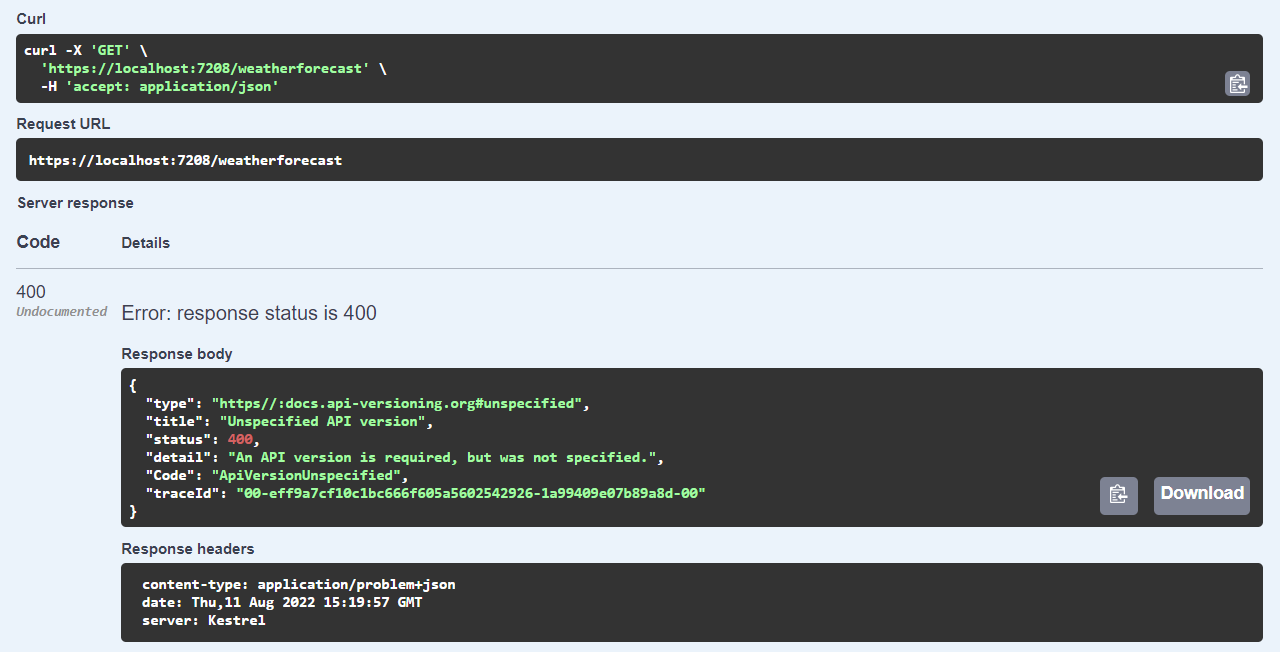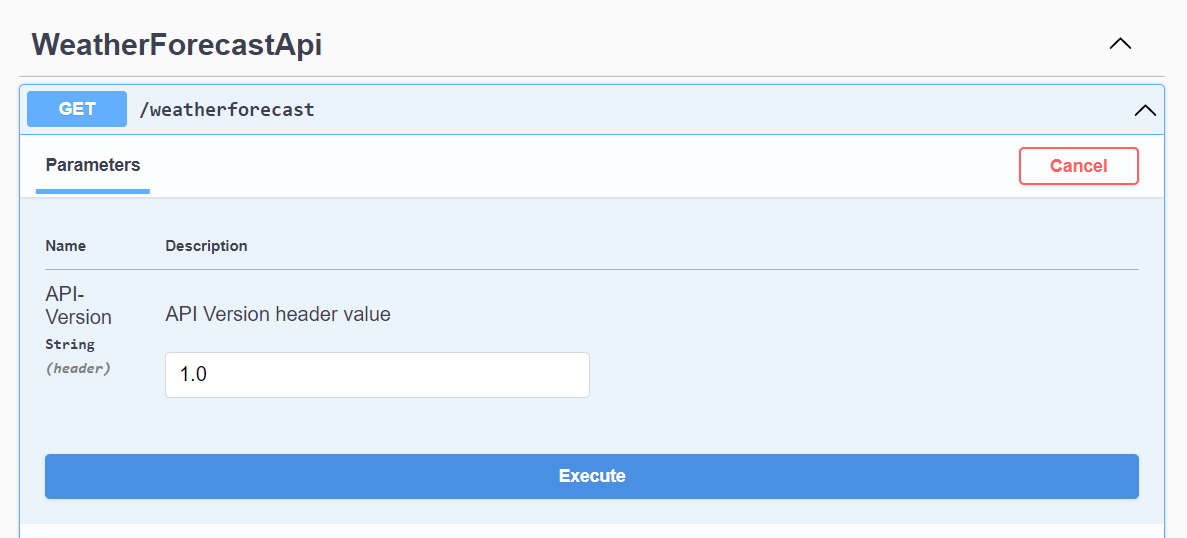API Versioning with ASP.NET Core 6.0 Minimal APIs
August 11, 2022 by Anuraj
AspNetCore DotNetCore MinimalApi
This post is about how to implement api versioning in ASP.NET Core 6.0 Minimal APIs. Earlier Minimal APIs versioning was not supported. Recently ASP.NET Core team introduced versioning in ASP.NET Core Minimal APIs. To implement it, first we need to create a Web API with Minimal API - we need .NET 6.0 or more to do this. Since I installed .NET 7 Preview versions, I am using the --framework version parameter. We can create web api with the command like this - dotnet new webapi -o WeatherForecastApi -minimal --framework net6.0. Once it is done, we need to add reference of Asp.Versioning.Http version 6.0.0-preview.3 using the command dotnet add package Asp.Versioning.Http --version 6.0.0-preview.3.

Then the project file looks like this.
<Project Sdk="Microsoft.NET.Sdk.Web">
<PropertyGroup>
<TargetFramework>net6.0</TargetFramework>
<Nullable>enable</Nullable>
<ImplicitUsings>enable</ImplicitUsings>
</PropertyGroup>
<ItemGroup>
<PackageReference Include="Swashbuckle.AspNetCore" Version="6.2.3" />
<PackageReference Include="Asp.Versioning.Http" Version="6.0.0-preview.3" />
</ItemGroup>
</Project>Next we need to modify the Program.cs file and add the versioning support.
builder.Services.AddApiVersioning();And we need to create an instance of version set, which will help add versions.
var versionSet = app.NewApiVersionSet()
.HasApiVersion(new ApiVersion(1, 0))
.HasApiVersion(new ApiVersion(2, 0))
.ReportApiVersions()
.Build();And finally apply the version set to the endpoints like this.
app.MapGet("/weatherforecast", () =>
{
var forecast = Enumerable.Range(1, 5).Select(index =>
new WeatherForecast
(
DateTime.Now.AddDays(index),
Random.Shared.Next(-20, 55),
summaries[Random.Shared.Next(summaries.Length)]
))
.ToArray();
return forecast;
})
.WithName("GetWeatherForecast").WithApiVersionSet(versionSet);Now we are ready with the versioning support. Run the app and open the swagger endpoint and execute the GET request. Since we didn’t specified the version, we will get a BadRequest response.

We can fix this by accessing the weatherforecast URL with api-version=1.0 query string like this - https://localhost:7208/weatherforecast?api-version=1.0. We can fix this issue by modifying AddApiVersioning() with following parameters.
builder.Services.AddApiVersioning(options =>
{
options.DefaultApiVersion = new ApiVersion(1, 0);
options.ReportApiVersions = true;
options.AssumeDefaultVersionWhenUnspecified = true;
});Since the Versioning options configured like DefaultApiVersion and AssumeDefaultVersionWhenUnspecified we don’t need to pass api-version the query string. And the ReportApiVersions configured, the API will return the supported versions as Header.

I prefer the version information passed as header instead of query string. To do this, first we need to configure the ApiVersionReader inside the AddApiVersioning method like this.
builder.Services.AddApiVersioning(options =>
{
options.DefaultApiVersion = new ApiVersion(1, 0);
options.ReportApiVersions = true;
options.AssumeDefaultVersionWhenUnspecified = true;
options.ApiVersionReader = new HeaderApiVersionReader("api-version");
});Now we can invoke the GET request by sending a api-version header. Here is an example - curl --header "Api-Version: 1.0" https://localhost:7208/weatherforecast. And to support Open API / Swagger we need to implement IOperationFilter interface and add the implementation to the AddSwaggerGen method. Here is an implementation.
public class ApiVersionOperationFilter : IOperationFilter
{
public void Apply(OpenApiOperation operation, OperationFilterContext context)
{
var actionMetadata = context.ApiDescription.ActionDescriptor.EndpointMetadata;
operation.Parameters ??= new List<OpenApiParameter>();
var apiVersionMetadata = actionMetadata
.Any(metadataItem => metadataItem is ApiVersionMetadata);
if (apiVersionMetadata)
{
operation.Parameters.Add(new OpenApiParameter
{
Name = "API-Version",
In = ParameterLocation.Header,
Description = "API Version header value",
Schema = new OpenApiSchema
{
Type = "String",
Default = new OpenApiString("1.0")
}
});
}
}
}Next we need to update AddSwaggerGen() method like this - builder.Services.AddSwaggerGen(setup => setup.OperationFilter<ApiVersionOperationFilter>());. Once it is done, we can run the application and which will display the version parameter like this.

If we want to support specific version, we can do this using MapToApiVersion() method like this.
app.MapGet("/weatherforecast", () =>
{
var forecast = Enumerable.Range(1, 5).Select(index =>
new WeatherForecast
(
DateTime.Now.AddDays(index),
Random.Shared.Next(-20, 55),
summaries[Random.Shared.Next(summaries.Length)]
))
.ToArray();
return forecast;
})
.WithName("GetWeatherForecast").WithApiVersionSet(versionSet).HasApiVersion(new ApiVersion(1, 0));This way we can enable support for versioning in Minimal APIs with ASP.NET Core 6.0. Similar to the Web API versioning, it support most of the versioning methods and features.
Happy Programming :)
Found this useful? Share it with your network!
Copyright © 2026 Anuraj. Blog content licensed under the Creative Commons CC BY 2.5 | Unless otherwise stated or granted, code samples licensed under the MIT license. This is a personal blog. The opinions expressed here represent my own and not those of my employer. Powered by Jekyll. Hosted with ❤ by GitHub
